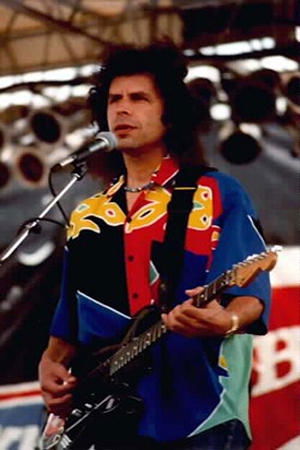Randy California (1951-1997)
Alias:
Randy Craig Wolfe
Randy Wolfe
Birthplace:
Los Angeles, California, U.S.
Born:
February 20, 1951
Died:
January 2, 1997
Randy Craig Wolfe (February 20, 1951 – January 2, 1997), known as Randy California, was an American guitarist, singer, and songwriter, and one of the original members of the rock group Spirit, formed in 1967. California was born as Randy Craig Wolfe into a musical Jewish family in Los Angeles and spent his early years studying varied styles at the family's Los Angeles folk club, the Ash Grove, which was founded by his uncle, Ed Pearl. He was 15 years old when his mother Bernice Pearl and his new stepfather, Ed Cassidy (later to become a founding member of the band Spirit, with Randy), moved to New York City in the summer of 1966 because Cassidy had a number of jazz gigs lined up. It was there, at Manny's Music, that he met Jimi Hendrix. He played in Hendrix's band Jimmy James and the Blue Flames that summer. California, Cassidy and Pearl lived in an apartment building in Forest Hills, Queens called the Balfour, whose other residents included future Steely Dan co-founder Walter Becker, who cited California's blues-based guitar style as an influence on his own playing. The stage name "Randy California" was given to him by Hendrix to distinguish him from another Randy in the band, Randy Palmer, whom Hendrix dubbed "Randy Texas". When Hendrix and California were invited to come to England by Chas Chandler, former bassist of British Invasion band the Animals—who became Hendrix's manager and producer—Randy's parents refused to allow him to go, insisting the 15-year-old stay and finish high school. By some accounts, Chandler wanted Hendrix as the only guitarist for the band and nixed California's going to England. Together with Cassidy, songwriter/frontman Jay Ferguson, bassist Mark Andes (with whom California and Cassidy had initially formed a band called the Red Roosters), and keyboardist John Locke, California founded the band Spirit. Their first, self-titled album was released in January 1968, a month before California's 17th birthday. He then wrote the band's biggest hit, 1968's "I Got a Line on You" for Spirit's second album, The Family That Plays Together. He also wrote the single "1984", inspired by George Orwell's novel of the same name. Released in early 1970, "the song was so pointed against the U.S. government that it was banned from many radio stations, although it was a huge hit in Germany." In Canada, the song reached #66. California also wrote Spirit's other hit, "Nature's Way", for the band's best-selling album, Twelve Dreams of Dr. Sardonicus. California drowned in the Pacific Ocean in 1997 at the age of 45 while rescuing his 12-year-old son Quinn from a rip current near his mother's home in Molokai, Hawaii. He managed to push Quinn (who survived) toward the shore. The Randy Craig Wolfe Trust was established after his death and, using royalties from California's recording contracts, financially supports the Randy California Project, an after-school music education program for underprivileged elementary school children in Ventura County.





